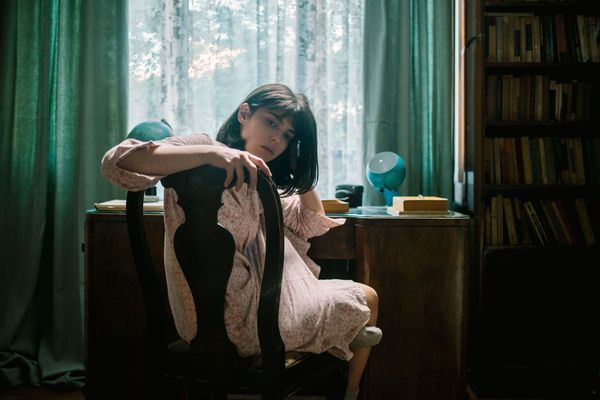Eye For Film >> Movies >> Metronom (2022) Film Review
Metronom
Reviewed by: Amber Wilkinson

The shadow of the Ceaucescu dictatorship hangs over this coming-of-age tale from Romania adding a dark dimension to more familiar themes. It’s nearly time for the exams and, like teenagers everywhere, this group of youngsters in Seventies Bucharest are navigating first love and parental rules, while also gathering together when they can. The difference is that the sheer act of tuning in to the show Metronom 72 on the clandestine Radio Free Europe, which plays western acts like The Doors, is an act of lawbreaking - and that’s before you get to the request letter they are trying to smuggle out of the country.
Alexandru Belc shows how small acts and emotions are amplified in an environment of oppression and surveillance. Going to a mate’s house to listen to music and coming home by 8pm sounds like a positively tame ambition for teenager Ana (Mara Bugarin) but the reaction of her mum (Andreea Bibiri) to the suggestion clues us into the fact that more may be at stake. The stakes are high for Ana too, who initially wasn’t planning on going but wants to see her boyfriend Sorin (Șerban Lazarovici) to try again to convince him not to leave the country with his family. This smaller drama will soon become swallowed up by a much more existential threat from the Securitate state police.

It’s little surprise that Belc chooses the boxy Academy ratio for a film in which its characters are confined by their environment, whether they fully realise it or not. The colour palette also feels muted, even the magenta dress which Ana borrows from her mate to wear during their ‘party’ seems to have had the vividness sucked from it by their surroundings. There’s energy aplenty, though, in the minds and movements of the young as we watch them enjoying the simple pleasures of flirtating and dancing along to Romanian tracks by the likes of local cult star Mircea Florian as well as The Doors. But when it turns out the police know about the party, their idealism will soon come up against a regime that thinks nothing of threatening extended violence in order to extract complicity – a situation that becomes increasingly tense as Ana refuses to bow to pressure to denounce her friends.
Belc, who won the Un Certain Regard directing award at Cannes, doesn’t need to show us much violence in order to indicate how the mere threat of it can become an effective tool of oppression. The situation is made all the more poignant by the fact that he has already emphasised just how 'young' Ana is in terms of her emotions and the fact that she is depicted not as a political firebrand, but just a kid who wants to stick by her mates, potentially just out of petulance. All of this makes her seem even more vulnerable as she attempts to stand up to Securitate officer Biris (Vlad Ivanov) as tension begins to thrum through the film's second half.
The measured nature of Belc’s film, if occasionally bordering on the overly sedate, emphasises the everyday feel – with the sense that this is just one such quashing of descent among hundreds, as the metronome of Ceaucescu’s oppression ticks mercilessly on.
Reviewed on: 06 Jun 2022
















